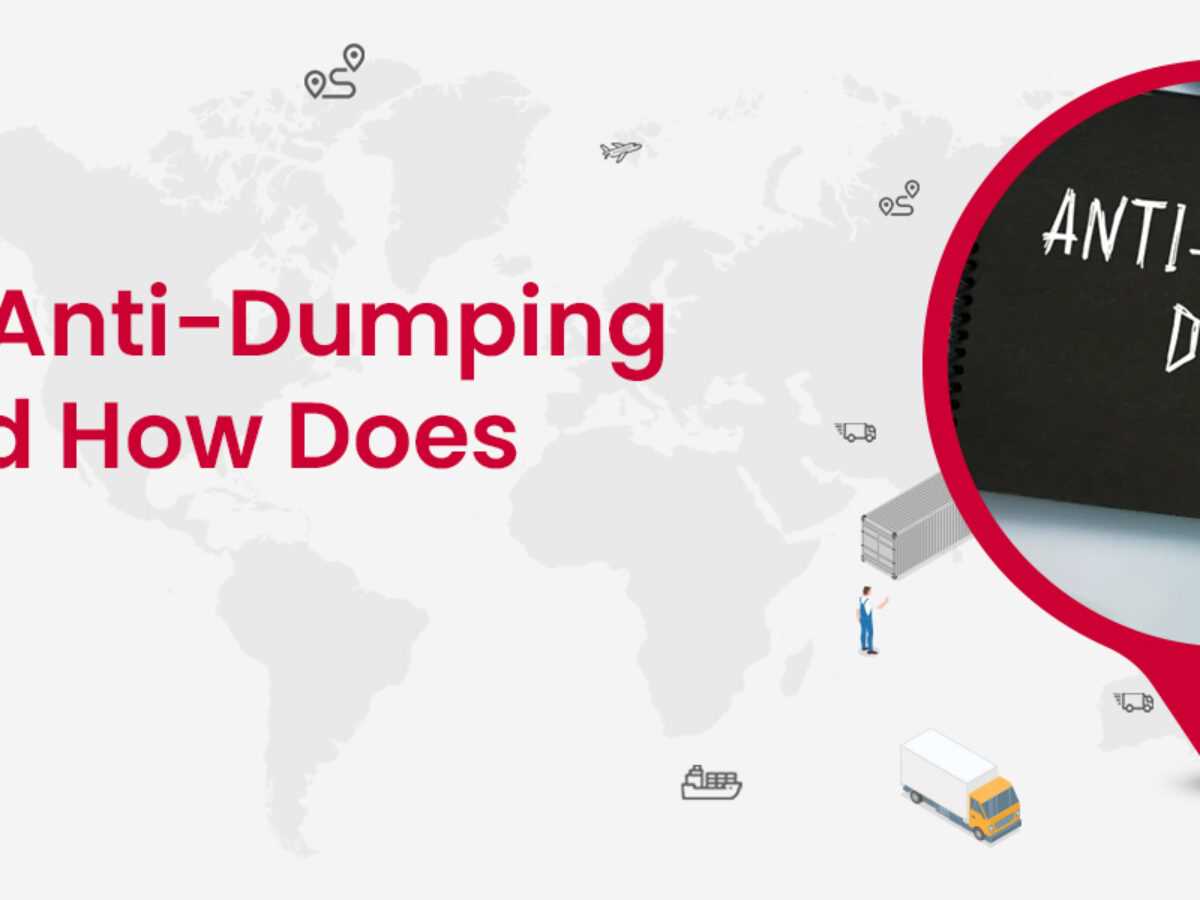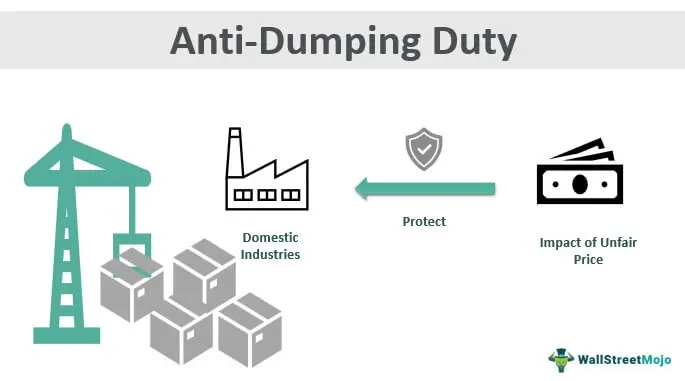What is Anti-Dumping Duty?
The purpose of anti-dumping duty is to restore fair competition in the market by imposing additional import duties on dumped goods. These duties are calculated based on the difference between the export price of the dumped goods and their normal value. The normal value is usually determined by comparing the export price with the price of similar goods in the domestic market or a third-country market.
The mechanism of anti-dumping duty involves a thorough investigation by the government or a designated authority to determine whether dumping has occurred and if it has caused material injury to the domestic industry. The investigation includes analyzing the price, volume, and effects of dumped imports on the domestic market. If dumping is confirmed and found to be harmful, the government can impose anti-dumping duties on the imported goods.
Anti-dumping duties are typically temporary measures and can be imposed for a specific period, usually five years. However, they can be extended if the domestic industry continues to suffer from the effects of dumping. The duties act as a deterrent to discourage unfair trade practices and protect domestic industries from being undermined by dumped goods.
Real-life cases of anti-dumping duty have been observed in various industries, such as steel, textiles, electronics, and agriculture. For example, in recent years, several countries have imposed anti-dumping duties on steel imports from China due to allegations of dumping and unfair competition. These measures aim to safeguard the domestic steel industry and prevent it from being negatively impacted by cheap imports.
Definition and Explanation
Anti-dumping duty is a trade remedy measure implemented by governments to protect domestic industries from unfair competition caused by dumping. Dumping occurs when a foreign company exports goods to another country at a price lower than its normal value or below the cost of production. This practice can harm domestic industries by flooding the market with cheap goods and undercutting local businesses.
The purpose of anti-dumping duty is to level the playing field and prevent unfair trade practices. It allows the government to impose additional import duties on dumped products, making them less competitive in the domestic market. By doing so, anti-dumping measures aim to protect domestic industries from the negative effects of unfair competition and ensure fair trade practices.
To determine whether anti-dumping duties should be imposed, an investigation is conducted by the government or an authorized body. This investigation involves analyzing the pricing practices of the exporting company, comparing the export prices with the normal value or cost of production, and assessing the impact on the domestic industry. If it is found that dumping is occurring and causing material injury to the domestic industry, anti-dumping duties may be imposed.
Anti-dumping duties are typically calculated based on the difference between the export price and the normal value or cost of production. The duties are then imposed as an additional tariff on the imported goods. The amount of duty can vary depending on the specific circumstances of the case and the level of unfair competition.
It is important to note that anti-dumping measures are subject to international trade rules and regulations. They must be implemented in accordance with the World Trade Organization (WTO) Anti-Dumping Agreement, which sets out guidelines and procedures for imposing anti-dumping duties. This ensures that anti-dumping measures are not used as a form of protectionism but rather as a legitimate tool to address unfair trade practices.
Mechanism of Anti-Dumping Duty

Anti-dumping duty is a trade remedy measure that aims to protect domestic industries from unfair competition caused by dumping practices. The mechanism of anti-dumping duty involves several steps:
- Investigation: The process begins with an investigation by the importing country’s government or trade authorities. They examine whether the dumped imports are causing material injury to the domestic industry.
- Dumping Margin Calculation: If it is determined that dumping is occurring, the authorities calculate the dumping margin. This is the difference between the normal value of the product in the exporting country and the export price to the importing country.
- Imposition of Duty: Once the dumping margin is calculated, the importing country can impose anti-dumping duties on the dumped imports. These duties are additional charges or taxes that are levied on the imported goods to offset the unfair advantage gained by the dumping practices.
- Appeals and Dispute Settlement: Importers or exporters affected by the imposition of anti-dumping duties can appeal the decision or seek dispute settlement through the World Trade Organization (WTO) or other relevant mechanisms.
The mechanism of anti-dumping duty aims to create a level playing field for domestic industries by preventing unfair trade practices. It provides a legal framework for addressing the negative impact of dumping on the domestic market and helps protect domestic industries from being undercut by unfairly priced imports.
How Anti-Dumping Duty Works
Anti-dumping duty is a trade remedy measure that aims to protect domestic industries from unfair competition caused by the dumping of goods at below their normal value. The mechanism of anti-dumping duty involves a series of steps to determine whether dumping has occurred and to calculate the appropriate duty to be imposed.
Dumping Investigation
The first step in the process is the initiation of a dumping investigation by the importing country’s government or an interested party. The investigation involves gathering evidence and data to determine whether the imported goods are being sold at a price lower than their normal value.
The normal value is usually determined by comparing the export price of the goods with the price of similar goods in the domestic market of the exporting country. If it is found that the goods are being dumped, the investigation proceeds to the next step.
Calculation of Dumping Margin
The next step is to calculate the dumping margin, which is the difference between the export price and the normal value of the goods. This is done by comparing the prices, costs, and profit margins of the exporting company with those of a representative domestic producer in the exporting country.
If the dumping margin is found to be significant, the importing country may impose anti-dumping duties on the imported goods to offset the unfair competitive advantage gained by the dumping. The duty is usually calculated as a percentage of the import price of the goods.
Implications and Enforcement
The imposition of anti-dumping duties has several implications. First, it helps protect domestic industries from unfair competition and prevents them from being driven out of business by dumped imports. Second, it creates a level playing field for domestic producers by ensuring that they can compete on equal terms with foreign producers.
To enforce the anti-dumping duties, customs authorities in the importing country are responsible for collecting the duties at the time of importation. They may require importers to provide documentation and evidence to prove that the goods are not being dumped or to determine the correct amount of duty to be paid.
Real-Life Cases of Anti-Dumping Duty
Anti-dumping duty is a trade remedy measure that is used by governments to protect domestic industries from unfair competition. It is imposed on imported goods that are being sold at a price lower than their normal value, causing injury to the domestic industry. Here are some real-life cases of anti-dumping duty:
1. Steel Imports from China
In 2016, the United States imposed anti-dumping duties on certain steel products imported from China. The US Department of Commerce found that these imports were being sold at unfairly low prices, which caused significant injury to the domestic steel industry. The anti-dumping duties helped to level the playing field for domestic steel producers and protect jobs in the industry.
2. Solar Panels from China

In 2012, the European Union imposed anti-dumping duties on solar panels imported from China. The EU found that these imports were being sold at prices below their normal value, which caused material injury to the European solar panel industry. The anti-dumping duties were imposed to prevent further harm to the domestic industry and to create a fair and competitive market for solar panels in the EU.
3. Textile Imports from India
In 2018, Canada imposed anti-dumping duties on certain textile products imported from India. The Canadian International Trade Tribunal found that these imports were being sold at prices lower than their normal value, causing injury to the domestic textile industry. The anti-dumping duties were imposed to protect the domestic industry from unfair competition and to ensure a level playing field for Canadian textile producers.
These are just a few examples of real-life cases where anti-dumping duties have been imposed to protect domestic industries from unfair competition. The imposition of anti-dumping duties is an important tool for governments to ensure fair trade and protect their domestic industries from harm.
Examples and Implications
Anti-dumping duties have been implemented in various countries around the world to protect domestic industries from unfair trade practices. Here are some real-life examples of anti-dumping cases and their implications:
1. Steel Imports in the United States

In 2018, the United States imposed anti-dumping duties on steel imports from several countries, including China, South Korea, and Japan. The U.S. Department of Commerce found that these countries were selling steel products in the U.S. market at unfairly low prices, which were below their production costs. This practice was deemed harmful to the domestic steel industry, leading to job losses and reduced competitiveness. The anti-dumping duties imposed on these steel imports helped to level the playing field for domestic steel producers and protect their interests.
2. Solar Panels from China
In 2012, the European Union (EU) imposed anti-dumping duties on solar panels imported from China. The EU found that Chinese solar panel manufacturers were receiving unfair subsidies and selling their products in the EU market at artificially low prices. This led to a surge in imports and significant market share loss for European solar panel manufacturers. The anti-dumping duties were imposed to address this unfair competition and provide relief to the domestic industry. As a result, the EU solar panel market became more balanced, and European manufacturers had the opportunity to compete on a level playing field.
3. Textile Imports in India
In 2019, India imposed anti-dumping duties on textile imports from China, Vietnam, and Thailand. The Indian government found that these countries were exporting textiles to India at prices lower than their normal value, causing material injury to the domestic textile industry. The anti-dumping duties were imposed to protect the interests of Indian textile manufacturers and prevent further damage to the industry. This measure helped to stabilize the market and create a fairer trading environment for domestic producers.
| Country | Product | Year | Implications |
|---|---|---|---|
| United States | Steel | 2018 | Protection of domestic steel industry |
| European Union | Solar Panels | 2012 | Leveling the playing field for European manufacturers |
| India | Textiles | 2019 | Protection of domestic textile industry |
These examples highlight the importance of anti-dumping duties in addressing unfair trade practices and protecting domestic industries. By imposing these duties, countries can safeguard their economies, preserve jobs, and maintain a fair and competitive marketplace.

Emily Bibb simplifies finance through bestselling books and articles, bridging complex concepts for everyday understanding. Engaging audiences via social media, she shares insights for financial success. Active in seminars and philanthropy, Bibb aims to create a more financially informed society, driven by her passion for empowering others.
